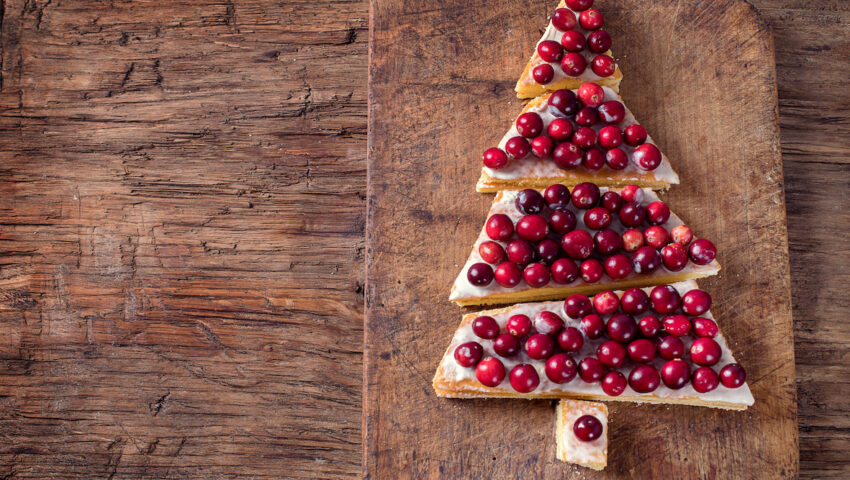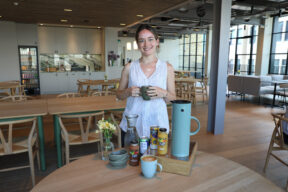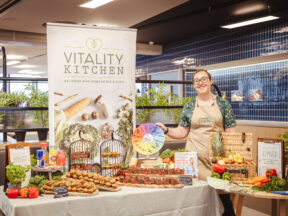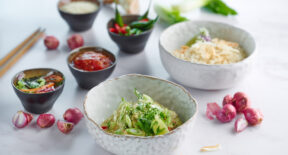Blogs
A Christmas Balancing Act

You’ll see many headlines this time of year around over-indulgence. Indeed, only a few days ago a report was published which compared the levels of sugar in festive drinks (1) sold in some large high street chains, which yielded some pretty shocking results. Equally, an increase in food-related marketing, with Christmas foods, supersized packet sizes and a ‘buy it now’ approach filling our supermarkets, adverts and shops. All of this means it can sometimes feel difficult to make healthier choices over the Christmas period.
On the flip side, during this time there is also a great deal of marketing around avoiding weight-gain during the festivities, with many headlines quoting the number of calories, or marathons you’d need to run to burn off what you’ve eaten on the day. Many people can feel anxious around eating at Christmas, worrying about the consequences of eating large meals, sweet treats and food-related gifts, due, in a large part to headlines like the ones mentioned above. Equally, comments from friends and family members about the foods they or you are eating, how guilty they feel about it, with the additional promises of ‘the diet starts in January’ mentality. All of this takes some of the enjoyment out of the day.
Is it possible to steer clear of this negative nutrition chat over Christmas?
The demonising of foods, or referring to food as ‘good or bad’ only grows over Christmas time, making it a challenging time for many. The wellness industry has bloomed over the last few years, with the growth of social media and influencers, with an increasing number of people adding their thoughts and opinions on foods. It’s always important to take a look at who you are getting your information from. More and more we look for quick and easy dietary advice from online sources. The biggest issue with this is that anyone can set themselves up to offer advice, regardless of their qualifications. If it’s nutrition advice you are after, look for nutritionists registered with the Association for Nutrition (ANutr or RNutr) or qualified dietitians.
Christmas Balancing Act
Achieving balance in all of this can be difficult, and this narrative often ignores that being ‘healthy’ covers a broad spectrum, not just the physical but also mental health.
Realistically, many of these things can influence this, not just the food we eat, but also our genetics, the environment we are in, stress, sleep, exercise, financial and food security among others.
Christmas is supposed to be a time of rest and enjoyment with friends and family, without feelings of guilt or anxiety about food or weight gain.
Research always leads back to the importance of a well-balanced diet with plants, lean protein, pulses, whole grains and healthy fats. Many of this things can, and will, be in your Christmas dinner without realizing it. Turn your focus to the positives such as the importance of sharing a good meal with loved ones as well as the bountiful seasonal produce on offer, rather than food guilt and negative comments.
Seasonality
There are so many great flavours and seasonal superstars this time of year. A traditional Christmas dinner can also be a great place to get a lot of vitamins.
My Christmas Superstars;
- Brussels sprouts
Love them or hate them, they’re a very versatile vegetable as well as being abundant in multiple vitamins. Steamed, roasted, boiled or grated raw into salads, the bad reputation that these vegetables have seems oddly misplaced. They’re a good source of Vitamin K, Vitamin C, Folate and a source of potassium.
- Roast turkey
The Christmas foundation – a roast turkey. As well as being a lean source of protein when prepared without the skin, it is also a source of Vitamins B6 and B12 which are important in supporting a healthy immune system. It’s also high in niacin, which as well as being important for the nervous system, is also important for bone health and muscle functioning.
- Chestnuts
These are a perfect accompaniment to many Christmas dishes, and the foundation of perfect stuffing, soups and sauces. They are naturally low in saturated fat, as well as being a source of potassium, which is important for the maintenance of normal blood pressure.
- Carrots & Parsnips
Carrots are a great source of beta-carotene, which is converted into Vitamin A in the body, key to good vision and a healthy immune system. Like many vegetables, they also provide us with fibre, and 80g makes 1 of your 5-a-day. While parsnips are a source of folic acid and potassium, important for the maintenance of normal blood pressure.
Food Waste
Food, quite rightly, is central to the celebration over Christmas. However, we often over-buy and a lot of food can get wasted. According to Unilever, every Christmas, British consumers throw away an estimated 2 million turkeys, 74 million mince pies and 5 million Christmas puddings (2). Additionally, it is predicted that this year more people will use emergency food parcels, with December being the busiest month for food banks. The Trussell Trust, charity, has asked the public to donate to their local food bank as soon as possible (3) to help those in need over Christmas.
It can sometimes feel like we are fighting a losing battle with food waste, but while at home, there are some things you can do over the festive period.
- Maximize the use of your freezer
A quick and easy way of stopping food from being wasted. The charity Love Food Hate Waste (4) has some excellent resources available on what you can and can’t freeze. Food is easily wasted when people go away for a few days, have a quick recce of your fridge before you do and see if there’s anything you can pop in the freezer instead of throwing away.
- Get creative with leftovers
There’s a host of excellent Christmas dinner leftover recipes that are slightly more exciting than a turkey sandwich. Get creative and turn your leftover Christmas pudding into a crumble, strudel, trifle or cheesecake. Check out Pete Redman’s Christmas blog to find more recipe ideas for leftovers (5).
- Get ahead and prepare early
Clear out your freezer before the big day so you’ve got space for the leftovers. Make a meal plan for the festive period, thinking about how many guests you’ve got coming over. Think about some emergency meals you can make from store cupboard ingredients for impromptu visitors. If you’ve got time, make a few meals for this eventuality.
- Giving food
Share food with friends or neighbours, either in person or via a host of food waste aps and charities such as olio (6). Make some last-minute gifts of pickles, jams, chutneys, or kimchi with any left-overs or extra food.
References
- Action on Sugar. Festive Hot Drinks Loaded with Sugar & Calories Reveals Lack of Progress in Achieving Sugar Reduction Targets 2019.
- 74 million mince pies thrown away every Christmas. 2012.
Available from: https://www.unilever.co.uk/news/press-releases/2012/74-million-mince-pies-thrown-away-every-christmas.html
- The Trussell Trust. More people than ever expected to need a food bank ahead of Christmas 2019.
Available from: https://www.trusselltrust.org/2019/11/27/busiest-dec-ever-expected/
- Be a freezer hero | Love Food Hate Waste [Internet]. Lovefoodhatewaste.com. 2019 Available from: https:https://lovefoodhatewaste.com
- https://www.bartlettmitchell.co.uk/foodie-blog/preparing-for-christmas-its-all-in-the-ps/
- OLIO – Share more. Waste less. Available from: https://olioex.com/





